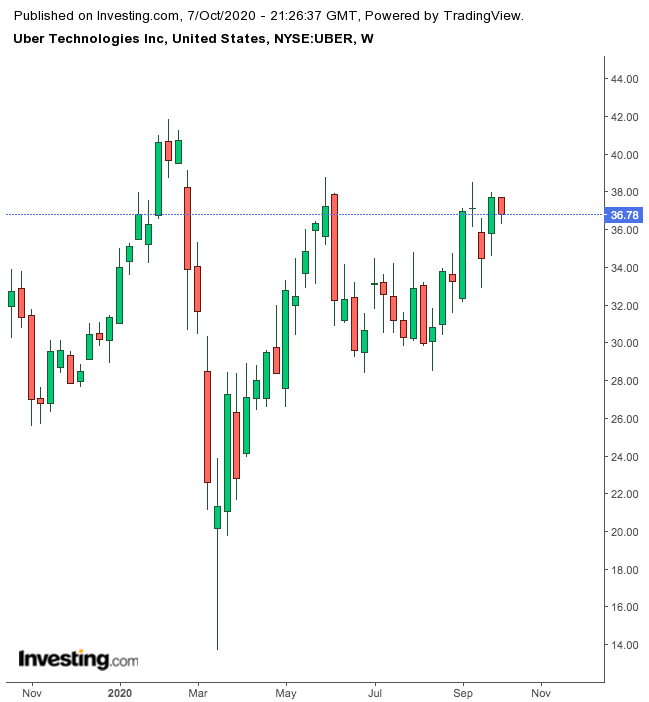Ride-hailing services have become a key indicator for the revival of normal life in this pandemic-hit economy. Their bookings collapsed during the first quarter as the rapid spread of the virus forced governments to institute lockdowns and mass closure of businesses and offices.
That situation pressured shares of Uber Technologies (NYSE:UBER), the world’s largest ride-hailing service, and competitors, causing them to plunge. But as economies around the globe continue to cope with the virus, which has drastically changed our travel routines, it's becoming clear that some transportation companies in this digital world can survive.
After plummeting 50% in March, since then, Uber stock is up 144%. Shares of the San Francisco-based company closed Wednesday at $36.78 in New York, up more than 20% for the year.

But other players are not seeing the same powerful rebound. Shares of LYFT (NASDAQ:LYFT), Uber’s major rival in North America, are still down 38% for the year.
What separated Uber from other players during this global health crisis was its business diversification. The company’s food-delivery business thrived during the pandemic, helping to mitigate the hit that came from people taking fewer rides.
In the second quarter, Uber generated more revenue from delivering food than transporting people. Sales fell 29% in the Q2 to $2.24 billion, but delivery revenue surged 103% and is now central to Uber’s growth strategy. This year, Uber has further strengthened its position in the delivery business by acquiring Postmates in a $2.65-billion deal. The US-based, on-demand prepared-food delivery service operates in close to 3,000 cities across the country.
Uber has also begun delivering other items, including groceries, prescriptions and packages. Uber now includes UberEats, its food delivery service, as part of the delivery category. After the Postmates deal, Uber controls 37% of that market, second to DoorDash (45%).
Hybrid Structure
According to a recent note by Oppenheimer, Uber’s hybrid rides/food structure has allowed drivers to be re-purposed during COVID-19 and keep more users engaged, potentially reducing marketing and promotion spending after the pandemic.
In an investor conference last month, Uber CFO Nelson Chai told stakeholders that perhaps the worst is over in the ride-hailing unit, as gross bookings improve. In August, for example, the gross booking volume was down less than 10% year-over-year, from a 12% plunge in July and 36% in Q2.
As Stifel Nicolaus analyst Scott Devitt said on Sept. 8 while reiterating his Uber buy rating and bumping up his price target from $40 to $41:
“For a longer-term horizon, we continue to recommend Uber shares as a recovery-scenario investment idea with a stay-at-home floor in food delivery.”
Uber’s quick cost-cutting effort, as a way to deal with the pandemic drop in its ride-sharing service, is another factor keeping investors calm during this crisis. Uber has announced a series of moves to trim expenses, including ending food delivery operations in more than half a dozen countries and cutting about a third of the workforce in its vehicle-for-hire service in the Middle East, known as Careem. In May, Uber announced it would lay off 14% of its staff.
One potential threat that Uber and other gig-economy companies are facing is government propelled. California’s legislature, last year passed a law aiming to make Uber and other operators reclassify workers, who are now independent contractors, as employees. This move makes them eligible for work benefits, which could be a significant additon to the company's top-line expenses.
If Uber reclassifies drivers, ride prices would increase as much as 30% in San Francisco and as much as 120% in the less populated areas of California where demand is sparse, according to an analysis by Uber. Uber has resisted doing so, but was ordered to by a state judge in August. An appellate court is set to hear arguments in the case Oct. 13.
Bottom Line
Uber’s business model has proven very resilient during one of the biggest economic shocks of our times. That strength and diversification make it an attractive buy for long-term investors eyeing the post-pandemic economic recovery and any companies well-positioned to benefit from it.
Which stock should you buy in your very next trade?
AI computing powers are changing the stock market. Investing.com's ProPicks AI includes 6 winning stock portfolios chosen by our advanced AI. In 2024 alone, ProPicks AI identified 2 stocks that surged over 150%, 4 additional stocks that leaped over 30%, and 3 more that climbed over 25%. Which stock will be the next to soar?
Unlock ProPicks AI